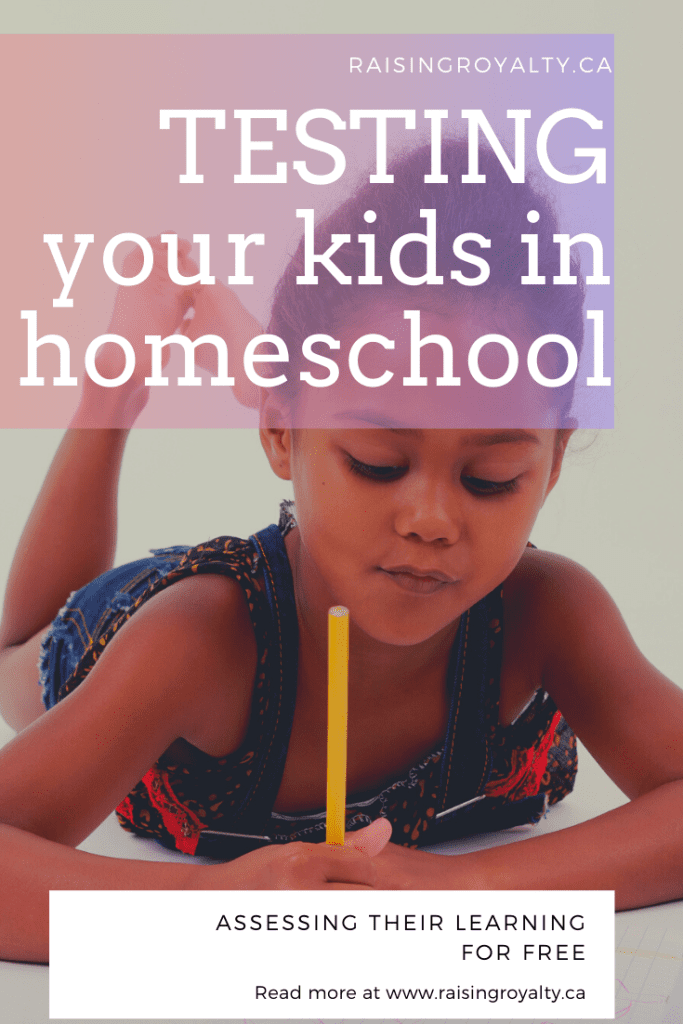
Testing is a big part of traditional school
A big part of every school child’s academic years is taking tests and quizzes. We brag about those report card grades and test scores too. And now we have those big standardized assessments featuring so heavily in the news. As homeschooling parents, how should or could we handle this issue of testing and grading our children? Are there tests for homeschool?
One of the biggest benefits of homeschooling for many families is less stress over testing. Parents may appreciate that their children are no longer stressed about “passing” or “failing”. They may even have pulled their children from public school to avoid excessive testing too.
When homeschooling, parents can teach their children at their own pace. They don’t have to consider grade levels or compare their students with their peers. I personally teach my elementary students for mastery, because either they understand it, or they don’t. And if they don’t, we study it and practice it until they do.
You know your kid. Do you need to test?
Because we work so closely with our children, testing them on their knowledge or understanding of concepts is often unnecessary. But that means that our children can reach high school age and be unused to the structures of formal testing. Learning how to take a test is a life skill that is important to understand too.
Assessments can help determine where the gaps are.
Sometimes parents pull their children out of school only to find the kids don’t know anything we might expect them to know. After a few weeks or months of attempting to teach them at home, parents get shocked by the gaps in their kids’ education. While many protest the current culture of standardized testing, assessments of children’s skills and knowledge can help the homeschooling parent tailor the curriculum to their child’s strengths and weaknesses.
Standardized testing is an option
There are a few normed tests that homeschoolers can use to assess where their children are at in the skills subjects (math, reading, writing, logic). Here’s a small sampling of tests for homeschool:
- Brigance: From IED assessments to preschool and early elementary, to the classic Comprehensive Inventory of Basic Skills, Brigance is well known and respected as a thorough assessment of children’s skills. Rather than testing on content, this test gives a picture of what level a student is working at.
- IOWA Test: Similar to Brigance, this is a normed test that looks at student achievement. It’s very popular with homeschoolers. It’s also accepted in most North American jurisdictions that require reporting.
- CAT Test: This is one of the tests that colleges can use to judge academic ability and future success. They may base admission or financial aid on the scores too.
Placement testing may work well too.
There are placement tests and assessments that can be used too. Many are free. Some are associated with individual curriculums — Alpha Omega and Sonlight both offer free placement tests. But that doesn’t mean you can’t use them to help figure out your child’s level of achievement in math, reading or writing. Because you can use them anyway. Here’s a list of some of the free online assessments you can use:
- Learn Math Fast Math test
- Internet 4 Classrooms printable tests on a variety of grades and subjects
- Sonlight Online Reading assessments
- Pioneer Valley Books Reading Assessment – registration required
- Alpha and Omega Reading and Kindergarten Readiness assessments — scroll down to the bottom of the page to find the printables
- Calvert Placement tests — K-Gr3 is free printable, but Gr 4-8 requires talking to a Calvert representative.
- Math & Reading Tests from Mindsprinting
- Math Mammoth printable Math placement tests
- Math U See printable Math placement tests
- High School Placement Tests from Keystone Online High School
- The Cambridge Academy Online placement test (free demo) — registration required
- Tutorified Kindergarten Readiness Assessment
- Teaching Mama printable Kindergarten Readiness assessment
If you have a free test or assessment tool to add to this list, please contact me.
Assess your teaching methods
Sometimes you may want to assess your own teaching skills. Or maybe you simply want to use quizzes and tests as part of your homeschool as well. Or you’d like to generate your own matching/puzzle/question-and-answer type worksheets as part of your homeschooling. Here’s a list of sites you can use to create your own tests for homeschool without tedious formatting in word processing software:
If you have a tool to add to this list, please contact me.

Grading their work
When you aren’t grading your children’s work, it can be easier to keep up with the planning and educating. But how do you handle tracking, recording and reporting grades, when and if you do use them? What about transcripts and report cards?
There are a few options for this too:
- Transcripts:
- Gradebooks (downloadable):
- 5J’s Gradebook (downloadable spreadsheet) — my personal favorite
- Excel Grade Tracker (online software)
- Gradebooks (online):
Of course, you could always grab a teacher’s planbook or just a notebook, and record your own.
Options are available.
However you assess your homeschooling efforts — whether before, to see if there were gaps left by public school — or after, to ensure you’re doing a good job, there are options. There are also options to record your assessments, and track your child’s progress as they learn.
Whether you choose to assess or not is up to you. Testing can be stressful and anxiety-inducing, but it is also a good skill to learn. It doesn’t have to be difficult or under pressure. Use these tools to better tailor your child’s education, as you need them.
Like this? Pin it!



Great resources! Thank you!! I’ve bookmarked your site because I expect to return often.
Thank you!